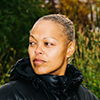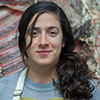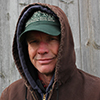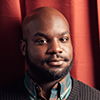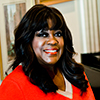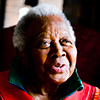



Jenkins, 90, is often called the First Lady of Children’s Folk Music. She started recording children’s songs in 1957 and has released more than 40 albums.
Interview by Steve Bogira
Photos by Alison Green

My Uncle Flood came from Little Rock, Arkansas. His name was Floyd Johnson, but everyone called him Flood. We had a large apartment, and he lived with us. My father had moved out. Uncle Flood worked in the steel mills in Gary, Indiana, and on the weekends he would relax, and sometimes take a little hot toddy. He wore a vest, and he kept harmonicas in each of the vest pockets. He could play blues. He’d be sitting in the dining room, and I’d go find myself a chair and just listen to him. It was like having concerts, because he could really play. Instead of playing straight-out chords, he could bend the notes. You inhale a certain way and get a sound that you don’t regularly get. It sounded almost like a train coming, and I just wanted to hear that sound. I would listen, and then I would try to make some sounds the way he would. He was happy when I would just try some of those notes. I became so interested in his harmonica playing that my mother gave me the money so I could go and get a harmonica, and I started playing too.

We had a jukebox in our dining room. Uncle Flood would order blues songs that I hadn’t heard before. I would go to places where they had live entertainment, like the Regal Theater on 47th and South Parkway. There were entertainers like Cab Calloway and others who I would try to emulate, and pretty soon I started singing a little bit. In high school they put on performances, and I always joined in.
Tap dancing was very popular when I was growing up, and I loved the sound. Sometimes it would be singles tap dancers, and other times people grouped together, two or three people tap-dancing—it was almost like singing, because they each had a part. When I got new shoes I would say, “Mother, would you make sure they put some taps on them?”

I enjoyed school—except I was in one fight, and I didn’t do too well. There was a girl—I must get her name right—Debra Crocktale. Well, I didn’t understand it too well, so I called her De-bor-ah Cocktail. She thought I was making fun of her name, but I really just didn’t know how to pronounce it. She said, “I wanna see you after school.” We got outside, and I didn’t know what to do, because I had never been in a fight before. I said, “I have to take my coat off,” because I was thinking my mother would give me a beating if I had my clothes all messed up. While I was taking it off she gave me a big whop. She beat me very well—she scratched my face and did all kinds of things, so I could hardly see after that fight, and some friends had to walk me home. I remember my mother putting butter on my face. I told her I didn’t want to go back to school, and she said I didn’t have to go back right away. I stayed home for quite a while, and then came back, and the girl even felt sorry for me. But I still grew up wanting to work with children.

When I went to churches where there was gospel singing, there was a lot of back-and-forth with the minister and the congregation. And Cab Calloway, when he was onstage, he did a lot of back-and-forth—I called him the Hi-De-Ho Man, because he had us doing that. With children, if you chant out something, they can repeat it, then pretty soon they remember it. And many times the children will take the lead themselves. I just seemed to meld right away with the children.

First of all you approach them with something that has struck you and that is important in your life. Songs that I have had success with, I share it with them, and some children pick it up right away, and others take a length of time.
I lived at 41st, and 39th Street, and then I moved to 56th Street, and then finally to Prairie Shores. I noticed that if you move from one neighborhood to another, you’d find the same song but sung in a different manner. Sometimes a little more accent—“Miss Mary Mack, dressed in black, buttons all up and down her back. Hi-yoh, hi-yoh—give me a nickel, give me a dime, see my honey baby all the time.” It would vary from neighborhood to neighborhood.

There are many teachers and students who try to copy my style of sharing songs and rhythms, and rhymes and games, and some of the songs that I’ve written. Many people, I’ve heard them singing them. There are people who work with children who found that my approach is done in such a simple way that they’re trying to do some of the same things themselves. I feel that if we want the children to enjoy, we have to enjoy what we’re doing ourselves.
In the 1960s I went to an art fair up in the near north, and I started walking around, and I said, “People seem to be more arty up here. One day I wouldn’t mind living up this way.” And so this is where I live now. I wondered if they accept all people, but I found out that as long as you could pay your way, you could stay. There were interracial couples and interracial churches and whatnot. I wanted to go somewhere that all people could be invited.

People are always giving me drums. So I have lots of drums at home, which is good, but I need to clear a few things out. I’m glad they’re not all large. I bought about 800 harmonicas, and I gave a lot of them away. I said, “I know I’ll never get around to blowing all of these.” I love the minor key—they used to call me A-Minor Ella. It’s kind of a soul sound—it seems like it’s where you can cry and feel more.
I enjoy not only working with the children but sometimes with adults. I conduct a lot of workshops for teachers. I was in Dallas recently. We had quite a number of people, sharing ideas, songs, rhythms, rhymes, and games that would be helpful in their work with children. I went on a train this time. I like to fly, go on trains, buses—it doesn’t bother me as long as they get me there on time. Sometimes I meet people in the vehicles. Meeting people from different backgrounds has helped me a great deal. I want to keep growing and learning.



